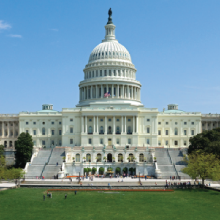by Jay Bitkower on September 1, 2017
Shortly before the U.S. Senate left for an undeserved paid vacation, they passed a flurry of minor bills including funding for the Food and Drug Administration, the FDA Reauthorization Act, by a vote of 94-1, and the Right to Try Act, which enables terminally ill patients to have access to investigational drugs, outside of the clinical trial process. An FDA-funding bill was previously passed by the House, while the Right to Try Act will now… More →
by Jay Bitkower on July 20, 2017
The results of a randomized trial of patient-reported symptom monitoring during cancer treatment is shown to increase overall survival and Quality of Life over standard care according to a presentation given by Ethan Basch, of the University of North Carolina, at a plenary session of the Association of Clinical Oncology annual conference this June. Go to http://www.ackc.org/symptom-monitoring-increases-survival/ to see the full trial summary.
by Jay Bitkower on June 26, 2017
In March 2017, the president signed the Consolidate Appropriations Act for FY2017, which called for a $10 million appropriation for kidney cancer research as part of the Congressionally Directed Medical Research Programs (CDMRP), managed by the Department of Defense. This past spring, ACKC lobbied for a continuation of kidney cancer’s $10 million funding for FY2018, which commences September 1st. CDMRP encompasses around 18 cancer types with most of them falling under the $60 million Peer… More →
by Jay Bitkower on May 7, 2017
Congress passed, and on May 5, the President signed the Consolidated Appropriations ACT for Fiscal Year 2017, which includes a $10 million line item for kidney cancer research under the Congressionally Directed Medical Research Programs (CDMRP). This represents the largest increase ever in the federal budget for kidney cancer research. View Our Video Kidney cancer strikes 64,000 Americans each year, and over 14,400 succumb to the disease. The $10 million will provide a shot… More →
by Jay Bitkower on December 26, 2016
Election Day was also a day in which four states have referendums on raising their taxes on cigarettes: Colorado, California, Missouri, and North Dakota. Below, we’ll look at the tax proposals, arguments for and against, campaign spending and the groups behind them, and the results of the voting. Much of the voting information is extracted from the Ballotpedia website. According to the Centers for Disease Control, over 480,000 Americans die from diseases caused by cigarette… More →
by Jay Bitkower on December 1, 2016
We did an analysis of the U.S Federal funding for the top 18 cancer types as a ratio of dollars spent versus the cancer type’s incidence and mortality rates. For dollars spent per incidence, brain cancer came out on top at $7,686 per incidence, followed by ovarian ($5,010) and leukemia ($4,545). Kidney cancer was in 14th place at $613 per incidence. For dollars spent per mortality, breast cancer came out on top at $15,842 per mortality… More →
by Jay Bitkower on November 29, 2016
ACKC VP Fred Atkin authored an article for the Fall edition of the American Urological Association’s AUA Investigator: Action to Cure Kidney Cancer (ACKC) is a nonprofit organization that advocates for increased federal and private funding for kidney cancer research. Thanks to their most recent advocacy efforts, the House passed the FY2017 Defense Appropriations bill, which includes a $10 million budgeted line item designated solely for kidney cancer research under the Congressionally Directed Medical… More →
by Bryan Lewis on May 19, 2016
After years of advocacy emphasizing the lack of kidney cancer federal funding, on Tuesday, May 17th, the House Appropriations Committee approved the FY17 Defense Appropriations Act and forwarded the bill to the full House. The fiscal year 2017 Defense appropriations bill includes a $10 million line item within the Defense Health Program, Congressional Directed Medical Research Program for kidney cancer research. This is great news for the kidney cancer community. If this legislation is enacted,… More →
by Jay Bitkower on January 7, 2016
The following books were recommended for reading to oncologists by the editors of the oncology journal, Cancer Network. Happy reading!
by Jay Bitkower on December 19, 2015
Congress highlights need for National Cancer Institute to increase attention to kidney cancer research and its early detection efforts. Yesterday (December 18, 2015), Congress passed the $1.8 trillion omnibus appropriation bill for Fiscal Year 2016 (October 1, 2015 – September 30, 2016). The bill calls for an increase of $2 billion in the NIH budged and $264 million in the National Cancer Institute’s budget, bringing the latter to $5.2 billion. This is good news considering… More →
by Jay Bitkower on October 19, 2015
Hans Hammers from Johns Hopkins Cancer Center won an Idea Award from the Department of Defense for Fiscal Year 2014 for “Enhancing Immune Checkpoint Inhibitor[1] Therapy in Kidney Cancer.” This is a two-year grant in the amount of $486,000 awarded to Dr. Hammers and Johns Hopkins. DoD grants have normally gone to pure researchers, but Dr. Hammers, aside from doing research, is also an eminent clinical oncologist who has made a number of presentations… More →
by Staff on July 14, 2015
Exelixis Announces Start of Phase 1 Trial of Cabozantinib in Combination with Nivolumab or Nivolumab Plus Ipilimumab in Patients with Advanced/Metastatic Urothelial Carcinoma and Other Genitourinary Tumors SOUTH SAN FRANCISCO, Calif. — (BUSINESS WIRE) — Jul. 13, 2015 — Exelixis, Inc. (NASDAQ:EXEL) today announced the initiation of a phase 1 trial of cabozantinib in combination with nivolumab alone or in combination with nivolumab plus ipilimumab in patients with advanced/metastatic urothelial (bladder) and other genitourinary tumors…. More →
by Bryan Lewis on May 1, 2015
Dr. W. Marston Linehan, Chief of Urologic Oncology at the National Cancer Institute (NCI) recently spoke to the advocacy group that gathered in Washington, DC, for ACKC’s annual Campaign for Research Funding. Dr. Linehan spoke to the group in layman’s terms regarding the recent advances in kidney cancer research (see video below). He described the strong sense of hope and excitement for major breakthroughs that may be coming as researchers are making significant progress regarding… More →
by Jay Bitkower on March 7, 2015
On March 4, 2015, the FDA approved the Bristo-Myers Squibb (BMS) immunotherapy drug nivolumab (Opdivo) for use in non-small cell lung cancer (NSCLC) patients for whom other drugs have failed. The approval was based on interim results in a Phase III trial testing nivolumab, at 3 mg/kg, against docetaxel, a chemotherapy drug. Nivolumb was found to have extended overall survival (OS) by three months over docetaxel, giving patients on nivolumab a median OS of 9.2… More →
by Jay Bitkower on February 16, 2015
A recent segment on NPR, segment, reported about a study, involving tens of thousands of participants over a 50-year period, by Dr. Barbara Cohn from UC Berkeley looking into the effect of environmental factors on the development of breast cancer in mothers and their children. Dr. Cohn plans to map out what’s called the “exposome” (see exposome), which is a map of the exposure of an individual over his or her lifetime to various environmental and… More →
by Bryan Lewis on December 24, 2014
John Ebos of Roswell Park Cancer Institute was granted a Career Development Award by the Congressionally Directed Medical Research Programs of the Department of Defense (DoD) to study, using a pre-clinical model, rebound and resistance to targeted therapies in RCC. This two-year grant was funded at $602,996 in Fiscal Year 2013 (the latest award year). This project is designed to answer a number of important questions, in regard to targeted therapy, that have not been… More →
by Jay Bitkower on December 7, 2014
Today ACKC is launching its new website, updating older material and adding new content, which we will continue to do in the future. Two new features on the Homepage are “News” and “Point of View” essays. News will commence with two articles, one highlighting two studies on the use of sunitinib (Sutent) in the elderly, and a second article featuring Maria Czyzyk-Krzeska from the University of Cincinnati. Maria is one of the two winners of… More →
by Staff on December 6, 2014
Maria Czyzyk-Krzeska of the University of Cincinnati received a two-year, IDEA grant of $474,562 from the Department of Defense to work on the effects of tobacco smoke on growth of clear cell renal cell carcinoma (ccRCC). Smoking is the major risk factor in getting kidney cancer, but the genetic signaling in RCC that is caused by smoking is little understood. The objective of the study is to determine the genetic mutations and other genetic sequencing… More →
by Jay Bitkower on December 5, 2014
A recent original study reported in Clinical Genitourinary Cancer ®, June, 2014, Vol. 12, No.3 provides a ray of hope for elderly patients with metastatic RCC. Led by Dr. Ugo De Giorgi and a team of Italian oncologists, a retrospective study of 185 patients revealed that an alternative regimen of up to half the standard dosage of sunitinib may be considered a treatment option. In many clinical practices, there are strong doubts regarding the use… More →



